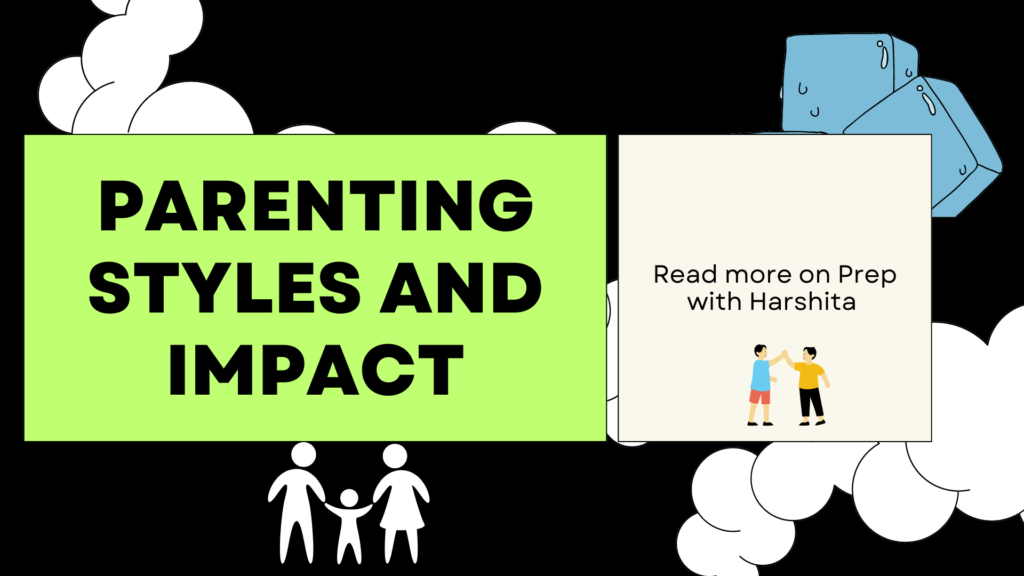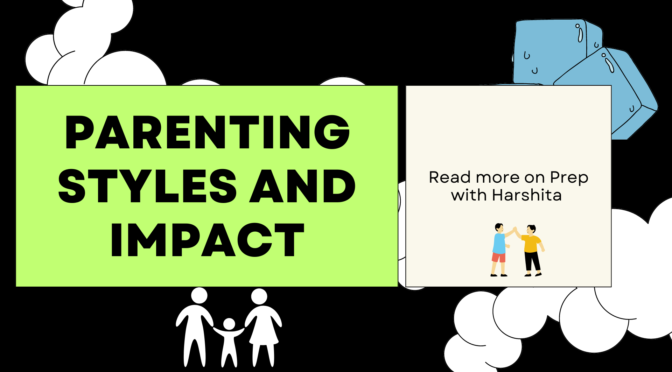Parenting style refers to the overall approach that parents use to raise their children, including the patterns of behavior, communication, and interaction. Different parenting styles have been identified, and they have distinct impacts on children’s development, behavior, and overall well-being.
Let’s delve into the details of each parenting style and impacts:
- Authoritative Parenting: Authoritative parenting is characterized by high levels of warmth, responsiveness, and support combined with reasonable levels of control and structure. Parents using this style set clear expectations and boundaries while also encouraging independence and autonomy. They provide guidance and consistent discipline while considering their child’s feelings and perspectives.
Impact:
- Positive Self-Esteem and Self-Confidence: Children raised by authoritative parents tend to develop a positive sense of self. They feel valued, competent, and have confidence in their abilities.
- Emotional Well-being: Authoritative parenting is associated with higher levels of emotional well-being in children. They are more likely to have better emotional regulation, coping skills, and overall mental health.
- Social Competence: These children tend to have better social skills and form healthy relationships. They are more empathetic, cooperative, and have effective communication skills.
- Academic Achievement: Authoritative parenting is linked to higher academic performance. These children are more motivated, have better study habits, and are more likely to engage in educational activities.
- Independence and Autonomy: Authoritative parenting fosters children’s independence and autonomy. They learn to make decisions, solve problems, and take responsibility for their actions.
- Authoritarian Parenting: Authoritarian parenting is characterized by high levels of control, discipline, and rule enforcement, often with little room for negotiation or flexibility. Parents using this style prioritize obedience and respect for authority, expecting strict adherence to rules and regulations. They may be less responsive to their child’s individual needs and opinions.
Impact:
- Reduced Self-Esteem: Children raised in authoritarian environments may have lower self-esteem due to the strict control and limited autonomy they experience.
- Decreased Autonomy: These children may struggle with decision-making, problem-solving, and assertiveness due to the lack of opportunities to make choices or voice their opinions.
- Conformity and Rule-Following: Authoritarian parenting tends to produce children who are rule-followers and conform to societal expectations. However, their internal motivation and critical thinking may be limited.
- Externalizing or Internalizing Behaviors: Some children may exhibit externalizing behaviors like aggression or rebellion, while others may display internalizing behaviors such as anxiety or depression due to the restrictive nature of authoritarian parenting.
- Permissive Parenting: Permissive parenting is characterized by high levels of warmth and responsiveness but low levels of control and structure. Parents using this style may be indulgent and lenient, avoiding the imposition of rules and discipline. They prioritize their child’s happiness and tend to be more of a friend than an authority figure.
Impact:
- Impulsivity and Lack of Self-Discipline: Children raised in permissive environments may struggle with self-control, as they have not been consistently guided or provided with clear boundaries.
- Difficulty with Authority: These children may have difficulty respecting authority figures and following rules in various settings, such as school or community.
- Lower Academic Achievement: Without consistent structure or expectations, these children may have lower academic performance and struggle with motivation and focus.
- Higher Self-Esteem, but Unprepared for Challenges: While these children may have higher self-esteem due to the positive and supportive environment, they may lack the skills needed to handle challenges or setbacks.
- Neglectful/Uninvolved Parenting: Neglectful or uninvolved parenting is characterized by low levels of both warmth and control. Parents using this style are emotionally distant and uninvolved in their child’s life. They provide minimal guidance, support, or supervision and may neglect their child’s needs.
Impact:
- Emotional and Behavioral Problems: Children raised in neglectful environments are more likely to experience emotional and behavioral difficulties, including depression, anxiety, aggression, and antisocial behavior.
- Attachment Issues: These children may struggle with forming secure attachments and trusting relationships due to the lack of emotional support and nurturing.
- Academic and Cognitive Challenges: Without parental involvement and support, these children may experience difficulties in school, lower academic achievement, and delayed cognitive development.
- Increased Risk-Taking Behaviors: The lack of parental guidance and supervision may lead these children to engage in risky behaviors such as substance abuse, delinquency, or early sexual activity.
It’s important to note that these parenting styles are not fixed categories, and many parents exhibit a combination of different styles based on different factors and contexts. Additionally, cultural influences and individual variations can impact how parenting styles manifest and their outcomes on children.
The impacts of parenting styles are not solely determined by the style itself but also by other factors such as the child’s temperament, genetic predispositions, and the consistency of the parenting approach. Furthermore, the quality of the parent-child relationship, open communication, and responsiveness to the child’s changing needs are crucial in influencing child outcomes.
Understanding different parenting styles and their potential impacts can help parents reflect on their own approach, make adjustments as needed, and strive for a balanced parenting style that promotes the optimal development and well-being of their children.
Also Read: Gender Identities

Also Visit: Prep with Harshita


Thank you for this thoroughly researched blog post; it’s a pleasure to learn from your insights.
THANKS LOADS for you POSTING THIS BLOG fabulous post! Need a custom book cover design? check this out http://www.buybookcoverdesign.com
Thank you for taking the time to read our post! Your engagement is deeply valued, and we sincerely appreciate your support.
Thank you for being a part of our audience. Your presence means the world to us and encourages us every day.
Can you be more specific about the content of your article? After reading it, I still have some doubts. Hope you can help me.
Thanks for sharing. I read many of your blog posts, cool, your blog is very good.